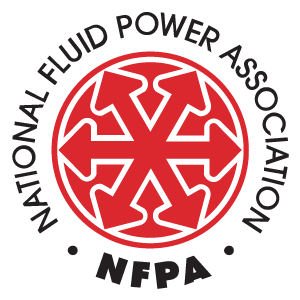Since 1969, NFPA has worked to foster cooperation among users and manufacturers by being involved in the development of fluid power ISO standards. NFPA holds the secretariat of ISO Technical Committee 131, fluid power systems, and is responsible for 237 published ISO standards, of which 27 projects are currently under development.
One of the strengths of ISO standardization is that the documents are created by the people who need them. In the United States, 135 industry experts participate on 11 technical advisory groups (TAGs) to drive all aspects of the standards development process, from deciding whether a new standard is needed, to defining the technical content. NFPA is encouraging our member companies to volunteer experts on one or more of the TC 131 subcommittees at both the national and international level.
Why do standards matter in fluid power?
ISO standards, technical specifications, and technical reports play a key role in fluid power technology. Designing, assembling, and maintaining a hydraulic or pneumatic system often involves putting together a variety of components, often from a variety of suppliers. Without standards for dimensional interchangeability, performance measurement and communication, safety requirements, and testing and inspection methods, these processes would be much more difficult.
Standards benefit users because they:
- simplify the use of fluid power;
- help educate users on how to correctly size and apply products;
- determine product performance and how it is measured, allowing comparison;
- communicate needs in a commonly understood language;
- are written with input from users.
Standards benefit manufacturers because they:
- provide uniform methods for testing products and advertising their ratings;
- help to assure system integrity and safety in the application of fluid power;
- help to improve efficiency of fluid power products and systems;
- simplify the variety of products and sizes in the marketplace;
- encourage new product development;
- help avoid confusion in communicating with customers.
Standards for fluid power products and systems fall into three basic categories:
- Communication standards define the basic terms, symbols and other communication tools used in the fluid power industry. Vocabularies, graphic symbols, and dimension codes are typical subjects for communication standards.
- Design standards establish dimensions, tolerances, or other physical characteristics of products. They ensure that fluid power products meet dimensional criteria that enable interfacing and interchangeability.
- Performance standards provide a voluntary method of rating products. Pressure rating, particle counting methods used in contamination analysis, and methods of testing for strength and volume are typical performance standards.
Why get involved in standards development?
Getting involved in this process can bring significant advantages to participating individuals and businesses alike. Advantages include:
- having early access to information that could shape the market in the future;
- giving your company a voice in the development of standards;
- helping to keep market access open.
Getting involved in standards development brings your concerns and needs to bear on the process that can affect you and your customers in the future.
How to get involved?
If you would like to join one of the subcommittees and/or to learn more about the development of fluid power ISO standards, contact Allison Forsythe at (414) 778-3369 or email aforsythe@nfpa.com
Like this post? Share it!
Recent Posts
Hear from an NCAT Student Engaged in NFPA Workforce Programs
We’re excited to share a new testimonial video from David Castro Lastor, a junior mechanical engineering student at North Carolina Agricultural and Technical State University and president of the university’s Fluid Power Club. In his video, David shares how participating in NFPA programs has shaped his academic and personal growth. Through his leadership in the…
New Episode of Fluid Power Forum: Advanced Modeling Techniques and Performance Comparisons of Electrohydraulic Systems
Today, our guest is Bruno Dupuis. Bruno is a Corporate Accounts Manager at Famic Technologies Inc., the company behind the development of Automation Studio™, a circuit design and simulation software for fluid power, electrical, robotics, process control and automation projects. He presented at NFPA’s Hydraulics Conference co-located at the 2024 iVT EXPO back in August.…
NAM Regulatory Update: NAM, GOP: Manufacturers and Families Need Pro-Growth Tax Measures
As part of an effort to bring more information about the regulatory and legal environment facing American manufacturers, NFPA is monitoring the newsfeed of the National Association of Manufacturers (NAM) and will be bringing important updates like this to the attention of NFPA members. (January 15, 2025) More than just the manufacturing sector depends on…



